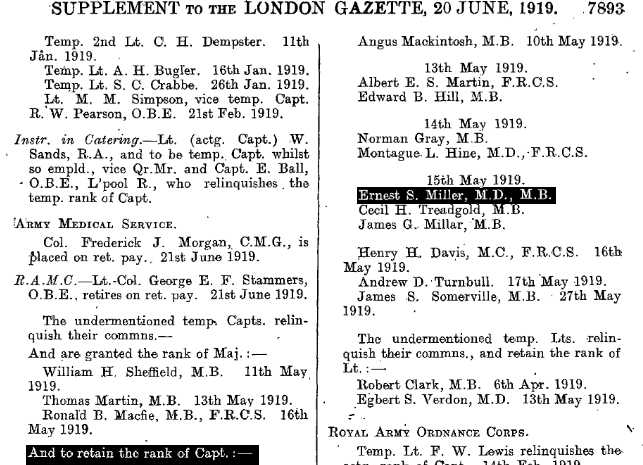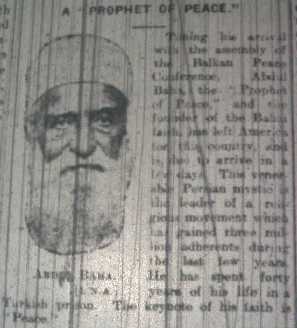Written and researched by
David
Bohl,
with the kind help of the British Medical Journals
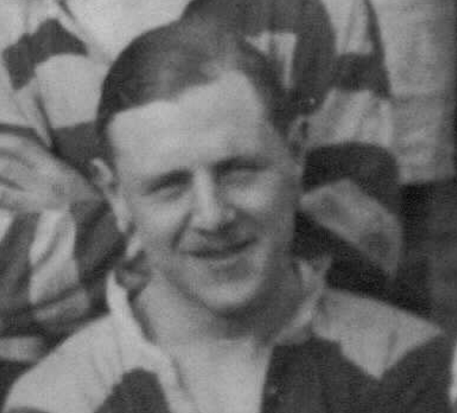
Ernest
Spencer Miller was born in
Liverpool, 1886 where his father was a Solicitor in Princes Park. He
lived in an impressive end terrace on Peel St with his two brothers and
two sisters, not forgetting the all important house servant.
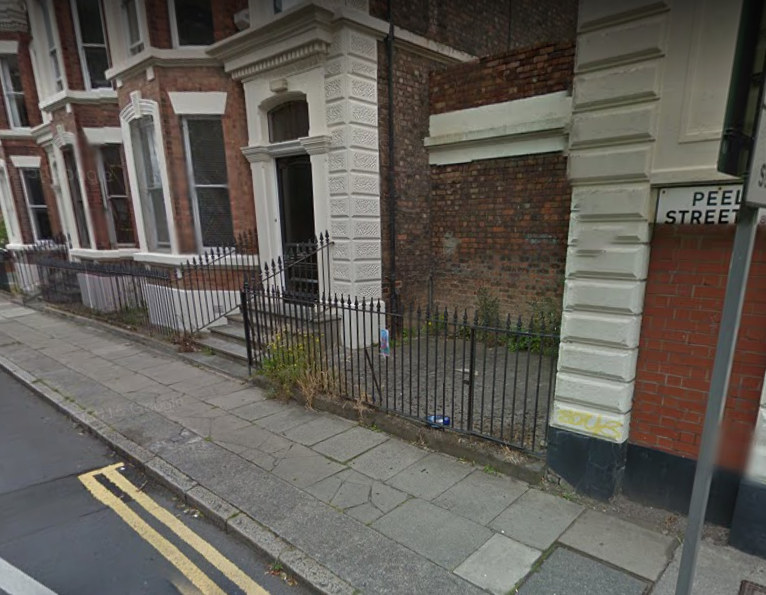
[Google
streetview]
Ernest
studied Medicine at the
University of Liverpool and after
qualifying in 1910 went on to complete the D.P.H (Dr of
Public
Health) and became Medical Practitioner at Rice Lane Workhouse. Gaining
his Doctor of Medicine(M.D) from London in 1914 and D.L.O (Diploma in
Laryngology and Otology) it was only three weeks
after
the declaration of war on the 28th July that he
was thrown
into
the fray of France with the British Expeditionary Force. He served in
the
Royal
Army
Medical Corps throughout the
conflict and rose to the rank of
Captain.
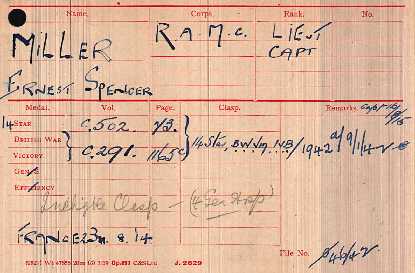
[Ancestry.com]
After the war he joined the reformed Aliens (now the suitably renamed
Sefton Rugby Club) with a number of other
Doctors, see Sefton
Doctors
Played
1920-21
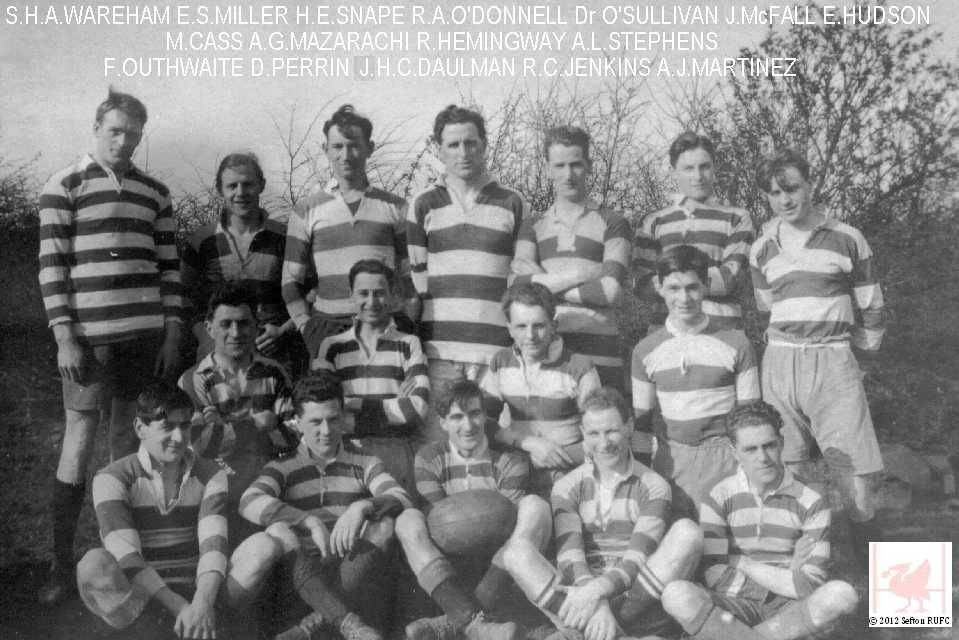
Back
Row S.H.A.WAREHAM Dr
E.S.MILLER
H.E.SNAPE
R.A.O'DONNELL
Dr
O'SULLIVAN
Dr
J.McFALL
E.HUDSON
Middle
Row M.CASS A.G.MAZARACHI R.HEMINGWAY
A.L.STEPHENS
Front
Row F.OUTHWAITE D.PERRIN H.C.F.DAULMAN
R.C.JENKINS
Dr
A.J.MARTINEZ
SEFTON
FAIL AT SOUTHPORT.
For
the major portion of the game at
Victoria Park, where
Sefton
were the visitors, there was only one team in it. In the first half
Sefton were rarely out of their own territory. This was not so much the
result of Southport's play as of the inefficiency of Sefton. Scott was
the first to get over, but the goal-kick was from an extremely
difficult angle, and J. Twynne was not to be blamed for failing. Before
the interval, Scott and Guest scored between the posts, and Gifford
easily added the extra points. Sefton did better in the second half,
Bellamy grounding the ball behind the uprights. Miller,
however,
placed
wide. Irving put Southport further ahead with a drop goal, but Gifford
and Twynne failed from tries by Walker and Buck. In all departments
Southport were the cleverer side. Result: Southport, 23; Sefton 3.
In
1921 he was made President of
the Royal Naval Recruiting Headquarters.
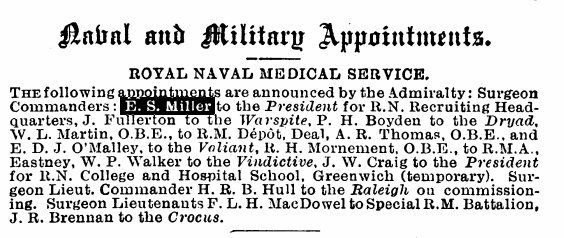
Throughout
the inter-war years his career
progressed admirably:-
- House Physician and House
Surgeon, Northern hospital
- Senior Assistant Medical
Officer, Mill Road Infirmary
- Clinical Supervisor,
Rainhill Emergency hospital
- Medical Supervisor, Townleys
Hospital, Bolton
- Medical Officer, Smithdown
Road Institution
- Fellow of the Royal Society
of Medicine
It
would seem Dr Miller was quite a
religious person and there are reports of him being a Quaker. This
might explain his 1907 passenger record of a trip to
Philadelphia where there is a large Quaker congregation.
[1920
First conference of Quakers
worldwide - A proposal was suggested at Yearly Meeting 1916
for a
post-war conference "of all those who bear the name of Friend" with the
intention of "giving full consideration to the deeply important subject
of how to secure a general and lasting peace". In November 1916,
Meeting for Sufferings appointed a committee to begin arrangements and
considerations for a Peace Conference of all Quakers. The World
Conference was proposed in 1917, and during World War I preparations to
facilitate the gathering continued between British Quakers in London
and American Quakers in Richmond and
Philadelphia.]
History
of
Quakers
After
enduring WW2 and being actively
engaged in WW1 it looks like he was deeply troubled by his
spirituality and in the early 1950's he rented a room out at
his
family home and practice to a Liverpool Community following the
Baha’i
faith, a Persian
religion founded by Baha'ullah (1817-1892). Their motto is "
The
well-being of mankind, its peace and security are unattainable unless
and until its unity is firmly established."
His interest may have been
seeded as early as 1912 when the
founders son
visited
Liverpool, the Echo reports his
arrival colourfully on the
White Star Line ship Celtic "he has a strange, striking and picturesque
personality. Habited in the the dress of a Persian learned or
cultured class - a white fez on his head, a flowing chocolate under
garment, surmounted by a cloak of blueish tinge - all eyes on
the
Stage were at once riveted upon him as he peered over the ship's side
into the rain and gloom of Liverpool."
Staying at the Adelphi Hotel he was invited to address the Theosophical
Society and to preach at the Unitarian Church Pembroke Chapel. He then
proceeded to London and Paris.
[
Timing
his arrival
with the assembly of the Balkan Peace Conference,
Abdul Baha, the "Prophet of Peace," and the founder (founders son)of the
Bahai faith
has left America for this country and is due to arrive in a few days.
This venerable Persian mystic is the leader of a religious movement
which has gained three million adherents during the last few years. He
has spent forty years of his life in a Turkish prison. The keynote of
the faith is "Peace".]
The election of the first Local Spiritual Assembly of
Liverpool took place at 19 Canning Street, Liverpool 8, on the evening
of April 14th 1950.
He
became a Bahá’í
in September 1951 and at great
sacrifice left his medical practice in 1955 to pioneer in Cardiff where
he started work at a local hospital.

[Photo
Liverpool Baha'i Community]
Dr Miller passed away in
Aughton, Lancashire in 1976
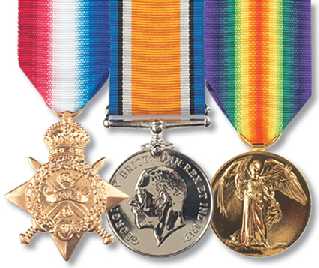 |
|
1914
Star, British War and Victory Medals
|
Dr Ernest
Spencer Miller M.D Ch.B M.B D.L.O




